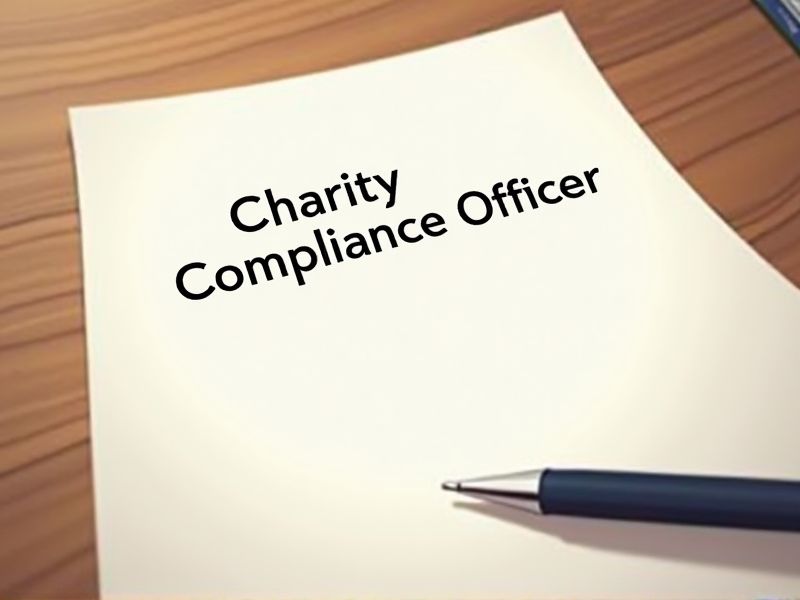
A Charity Compliance Officer plays a crucial role in ensuring that charitable organizations adhere to legal and ethical standards. Their responsibility to maintain transparency and ethical practices means they must be well-versed in regulatory requirements, which often necessitates specific certifications. These certifications equip officers with specialized knowledge to navigate complex legal landscapes and uphold the integrity of their organizations. Here are some important certifications you may need as a Charity Compliance Officer.
Certified Compliance & Ethics Professional (CCEP)
A Charity Compliance Officer with a Certified Compliance & Ethics Professional (CCEP) credential demonstrates a commitment to upholding ethical standards, reflecting positively on the charity's integrity. Having CCEP certification ensures the officer is knowledgeable about industry regulations and best practices, minimizing the risk of non-compliance and financial penalties. This certification equips the officer with skills to implement effective compliance programs that protect the organization's reputation and donor trust. Being certified differentiates the officer within the nonprofit sector, enhancing career growth prospects and organizational value.
Certified Fraud Examiner (CFE)
A Certified Fraud Examiner (CFE) equips a Charity Compliance Officer with the skills necessary to detect and prevent fraud, which directly reduces financial losses and enhances trust among donors. Expertise in fraud examination ensures the charity adheres to legal standards, mitigating the risk of non-compliance fines or penalties. CFEs possess a thorough understanding of financial statements and red flags, enabling more accurate and transparent reporting practices that align with stakeholder expectations. CFE knowledge aids in developing robust internal controls, which strengthens organizational governance and operations effectiveness.
Certified Internal Auditor (CIA)
A Certified Internal Auditor brings expertise in risk management and internal controls, key areas for ensuring a charity operates within regulatory requirements. They provide insights into financial governance, helping charities maintain transparency and accountability, essential for donor trust. The CIA designation ensures that the compliance officer has a strong ethical foundation, which is crucial for upholding the integrity of charitable operations. Their skills in identifying inefficiencies and recommending process improvements can lead to more effective use of resources, aligning with a charity's mission of maximizing impact.
Certified Nonprofit Professional (CNP)
A Certified Nonprofit Professional (CNP) possesses specialized knowledge of nonprofit management, enhancing a Charity Compliance Officer's ability to effectively navigate regulatory landscapes. This expertise ensures officers can efficiently implement best practices, safeguarding the organization's legal and ethical standards. The CNP credential provides a comprehensive understanding of resource management, important for maintaining financial transparency and accountability. With skills in strategic planning and leadership, a CNP-equipped officer improves organizational resilience and drives mission success.
Certified Charity Executive (CCE)
A Certified Charity Executive (CCE) provides essential expertise in nonprofit management, aligning an organization's operations with legal and ethical standards. By obtaining CCE credentials, a Charity Compliance Officer enhances their understanding of financial regulations and governance issues critical to maintaining donor trust. CCE training ensures they can effectively implement strategies that mitigate risks associated with compliance failures. This certification equips professionals to lead initiatives that uphold accountability and transparency in charitable organizations.
Certified Government Auditing Professional (CGAP)
A Certified Government Auditing Professional (CGAP) enhances a Charity Compliance Officer's understanding of government auditing standards, ensuring they can effectively navigate complex regulatory environments. This certification equips them with specialized skills to assess and improve the efficiency of compliance processes within charitable institutions. Possessing CGAP credentials can lead to more accurate internal audits, reducing the risk of financial mismanagement. Charitable organizations benefit from increased donor trust, as the CGAP ensures transparency and accountability are maintained.
Certified Regulatory Compliance Manager (CRCM)
A CRCM certification equips a Charity Compliance Officer with a thorough understanding of federal and state regulations, ensuring that the charity operates within legal boundaries. Enhanced knowledge of compliance fosters transparency and trust with donors and stakeholders. The certification aids in the identification and mitigation of potential legal risks, safeguarding the charity's reputation. CRCM credentials support structured governance and accountability in financial matters, crucial for maintaining public confidence.
Certified Risk and Compliance Management Professional (CRCMP)
Certified Risk and Compliance Management Professional (CRCMP) equips a Charity Compliance Officer with essential risk management skills, enabling them to identify and mitigate potential threats to a non-profit organization's integrity. It provides comprehensive knowledge on regulatory compliance, ensuring that charitable activities adhere to legal standards and ethical practices. CRCMP certification signifies an advanced understanding of financial controls, crucial for maintaining transparency and trust among stakeholders. The designation enhances credibility, assuring donors and partners that the organization is managed with expertise and diligence.
Project Management Professional (PMP)
A Project Management Professional (PMP) certification equips a Charity Compliance Officer with essential project management skills, ensuring efficient allocation of resources in charity operations. Mastering PMP techniques enhances a compliance officer's ability to navigate complex regulatory frameworks effectively. The structured methodology from PMP fosters better risk management and strategic decision-making in regulatory compliance. Having PMP certification often leads to improved communication and stakeholder engagement, crucial for maintaining transparent donor relations in the charity sector.
Certified Anti-Money Laundering Specialist (CAMS)
The rise in financial crimes has led regulatory bodies to enforce stricter compliance requirements on charitable organizations. Employing a Certified Anti-Money Laundering Specialist (CAMS) equips a Charity Compliance Officer with the expertise to detect and prevent money laundering activities within charitable donations. CAMS certification ensures that the officer is well-versed in the latest regulatory frameworks and best practices. This specialized knowledge helps protect the charity's reputation and secures donor confidence by adhering to legal obligations.
Summary
As a reader considering the influence of a Charity Compliance Officer obtaining certifications, you will likely observe an enhancement in their credibility and trustworthiness within the organization. This certification can lead to improved risk management practices, ensuring adherence to legal and ethical standards. You might notice a reduction in compliance-related issues, as the officer is better equipped with updated knowledge and skills. These changes can foster increased donor confidence, potentially boosting fundraising efforts.
